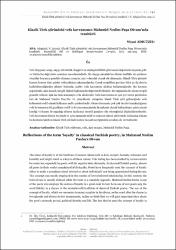| dc.contributor.author | Adıgüzel, Niyazi | |
| dc.date.accessioned | 2021-12-12T16:51:03Z | |
| dc.date.available | 2021-12-12T16:51:03Z | |
| dc.date.issued | 2019 | |
| dc.identifier.issn | 2148-7782 | |
| dc.identifier.issn | 2148-9599 | |
| dc.identifier.uri | https://doi.org/10.29000/rumelide.656691 | |
| dc.identifier.uri | https://app.trdizin.gov.tr/makale/TXprNU5URTFOUT09 | |
| dc.identifier.uri | https://hdl.handle.net/20.500.11857/2469 | |
| dc.description.abstract | Vefa duygusu; sevgi, saygı, dürüstlük, hoşgörü ve alçakgönüllülük gibi insanî değerlerin başında gelir ve bütün bu değerlerin anahtarı mesabesindedir. Bu duygu sanatkârlar elinde özellikle de şairlerce yüzyıllar boyunca genelde olumsuz yanıyla yani vefasızlık olarak ele alınmıştır. Klasik Türk şiirinde hemen hemen tüm şairler vefasızlıktan yakınmışlardır. Gerek sevgiliden gerekse felek ya da devrin kadirbilmezliğinden şikâyet babında, şairler vefa kavramını sıklıkla kullanmışlardır. Bu kavram çoğunlukla, âşık maşuk/sevgili ilişkisi bağlamında değerlendirilmiştir. Bu bağlamda ele alınan sevgili genelde vefasız; âşık ise tam manasıyla vefa abidesidir. Vefa kavramına en çok yer veren şairlerden biri de Mahmud Nedim Paşa'dır. O, yüzyıllardır süregelen klasik Türk şiiri geleneğinde vefa kelimesini redif olarak kullanan nadir şairlerdendir. Onun divanında pek çok beyitte karşılaştığımız vefa kavramının iki gazelinde redif ve iki musammatında da nakarat olarak kullanılması şairin siyasi kimliği ve hayatı ile yaşadığı dönem hakkında önemli ipuçları elde edeceğimizi düşündürmektedir. Vefa kavramını birçok beytinde ve aynı zamanda redif ve nakarat olarak şiirlerinde kullanmış olması bu kavramı işlerken klasik Türk şiirinde neden bu şairi seçtiğimizin cevabını da vermektedir. | en_US |
| dc.description.abstract | The sense of loyalty is at the forefront of human values such as love, respect, honesty, tolerance and humility and might stand as a key to all these values. This feeling has been studied by various artists for centuries, especially by poets, with its negative side; disloyalty. In classical Turkish poetry, almost all poets in their works complained of disloyalty. Poets have frequently used the concept of loyalty either to make a complaint about beloved or about individuals’ not being appreciated during the era. This concept was mostly employed in the context of lover/belowed relationship. In this context, the beloved one is usually disloyal while the lover is a complete opposite. Mahmud Nedim Pasha is one of the poets who employs the notion of loyalty in a great deal. In fact, he is one of rare poets usig the word fidelity in a rhyme in the centuries-old tradition of classical Turkish poetry. The use of the concept of loyalty, which we encounter in many couplets in his diwan, as the word after the rhyme in two ghazals and chorus in two musammats, makes us think that we will gain important clues about the poet's unsteady period, political identity and life. The fact that he used the concept of loyalty in his poems as the word after the rhyme and chorus as well as in many couplets gives the answer to why we chose this poet in classical Turkish poetry. | en_US |
| dc.language.iso | tur | en_US |
| dc.relation.ispartof | RumeliDE Dil ve Edebiyat Araştırmaları Dergisi | en_US |
| dc.identifier.doi | 10.29000/rumelide.656691 | |
| dc.rights | info:eu-repo/semantics/openAccess | en_US |
| dc.subject | [No Keywords] | en_US |
| dc.title | Klasik Türk şiirindeki vefa kavramının Mahmûd Nedîm Paşa Divanı'nda tezahürü | en_US |
| dc.title.alternative | Reflections of the term ‘loyalty’ in classical Turkish poetry, in Mahmud Nedim Pasha’s Diwan | en_US |
| dc.type | article | |
| dc.department | Fakülteler, Fen-Edebiyat Fakültesi, Türk Dili ve Edebiyatı Bölümü | |
| dc.identifier.volume | 0 | en_US |
| dc.identifier.startpage | 191 | en_US |
| dc.identifier.issue | 17 | en_US |
| dc.identifier.endpage | 205 | en_US |
| dc.relation.publicationcategory | Makale - Ulusal Hakemli Dergi - Kurum Öğretim Elemanı | en_US |
| dc.institutionauthor | Adıgüzel, Niyazi | |



















